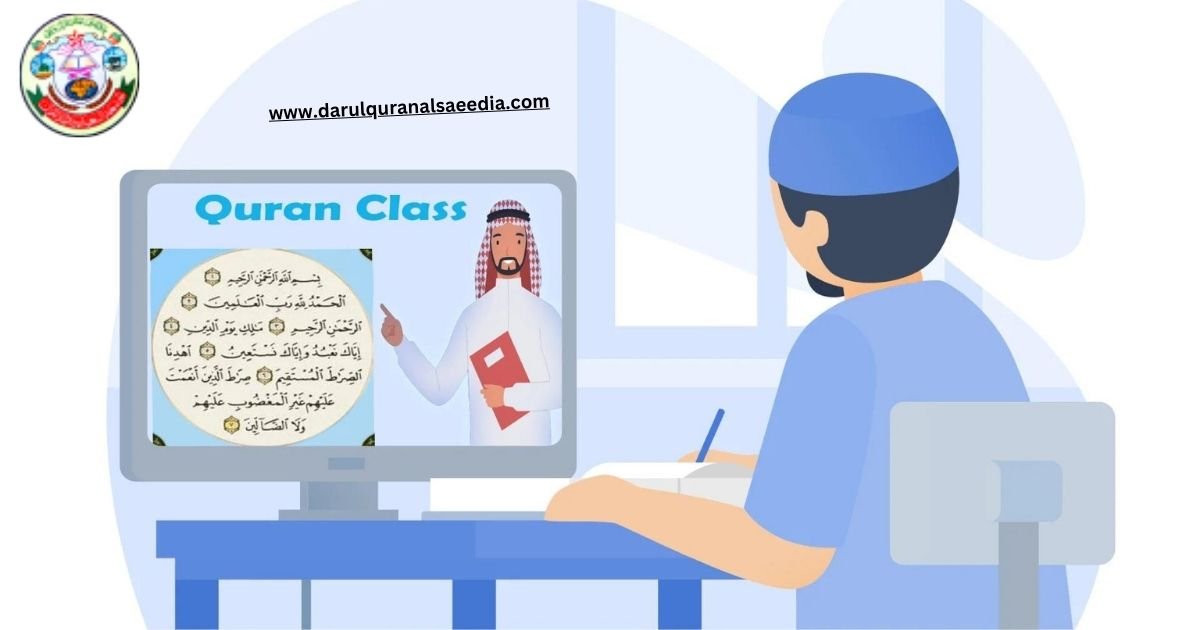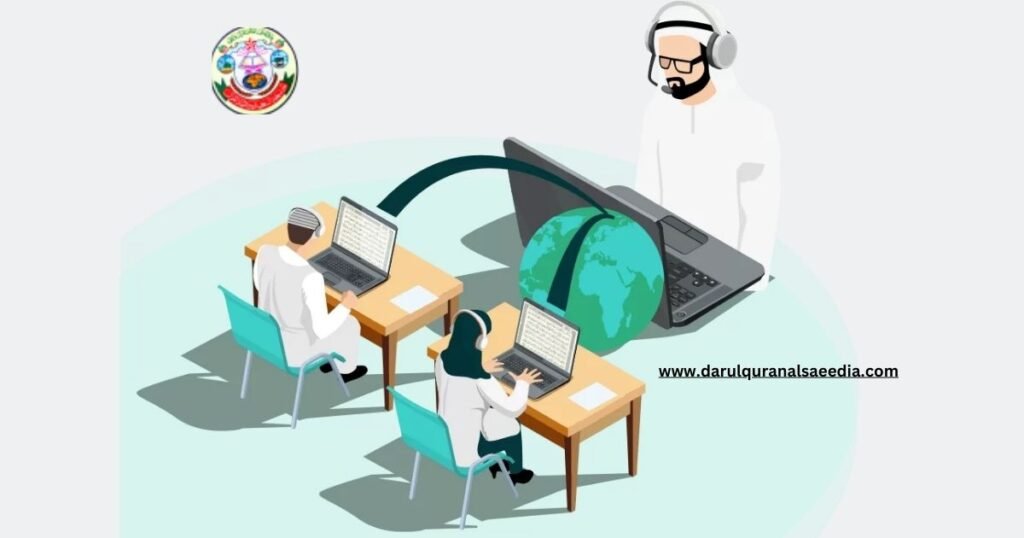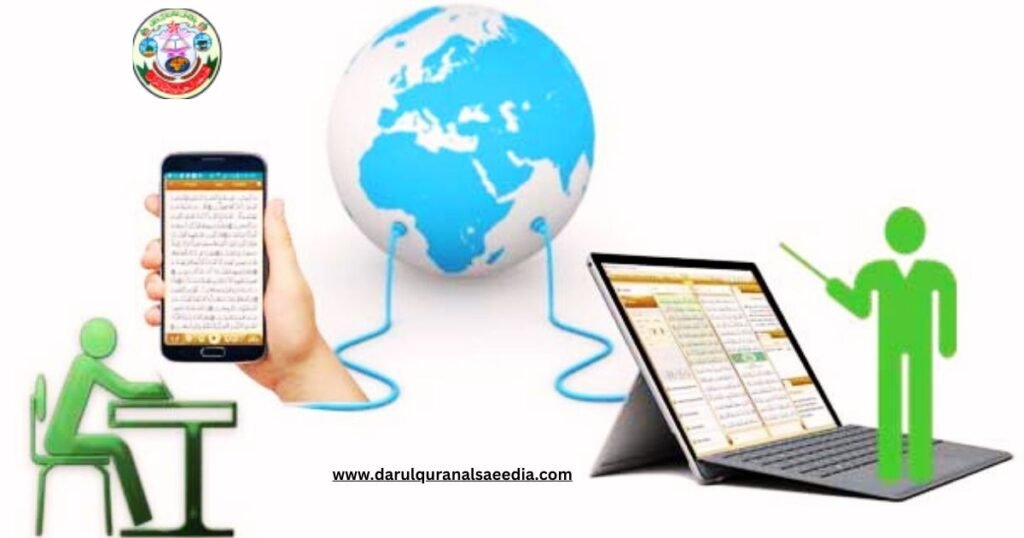Quran Classes Online | Learn Quran, Arabic & Islamic Studies Online 2025

Introduction
The Quran is the sacred text of Islam and is believed by Muslims to be the direct word of God as revealed to the Prophet Muhammad between 610 and 632 AD. As the foundational text of Islam, studying and memorizing the Quran is considered an important religious obligation for Muslims. Quran Classes Online In recent years, online Quran classes have emerged as a popular way for Muslims and non-Muslims alike to learn how to properly recite, interpret, and apply teachings from the Quran.
Online Quran classes offer a number of advantages over traditional in-person instruction at mosques and Islamic schools. They provide flexibility to study from anywhere at any time, open access to students around the world, and integration of multimedia tools to enhance the learning experience. Additionally, online Quran instructors utilize modern technology like video conferencing, screen sharing, and virtual whiteboards to simulate face-to-face classroom interaction.
In this article, we will explore the structure and content of online Quran classes, discuss the benefits they provide, review requisite technology platforms and tools, and share tips for selecting a reputable Quran tutor or program.
Read More: Quran Online Classes

Structure and Content of Online Quran Classes
Online Quran classes are structured similarly to traditional Islamic education classes but delivered fully through the internet. Standard curriculum components in online Quran courses include:
Recitation (Tajweed)
The most fundamental part of Quran studies is properly reciting verses and chapters via correct pronunciation and intonation, known as tajweed in Arabic. Online tajweed classes focus extensive time training and drilling proper Makharij (articulation points), sifaat (attributes), and rules for reciting the Arabic script.
Memorization (Hifz)
Memorizing all or part of the Quran is considered highly commendable in Islam. Online hifz classes emphasize memorization techniques like repeated listening, copying, and recalling verses. Quran Classes Online Virtual hifz programs also motivate students by tracking memorization progress and providing feedback.
Translation and Tafsir
Grasping meanings within Quranic content requires explore translation and tafsir (exegesis). Online Quran classes dedicate time to comprehending vocabulary and grammar, studying different translations, and discussing explanations from classic and contemporary Islamic scholars.
Fiqh (Islamic Jurisprudence)
Understanding and implementing Islamic jurisprudence related to Quranic guidance is central to practical application. Quran Classes Online Online fiqh classes examine legal rulings connected to Quranic verses and analyze case studies to develop competency in deriving law from scripture.
Arabic Language
As the Quran was revealed in Arabic, grasping vocabulary, grammar, morphology, and rhetoric is key to unlocking deeper meaning. Online Arabic classes focused on the Quran build language skills using verses and passages as primary learning texts.
History and Context
Insights into history and context surrounding Quranic revelations facilitate interpretation and application. Online Seerah classes cover the biography of Prophet Muhammad in Mecca and Medina during development of the early Muslim community.
In addition to areas of core focus outlined above, online Quran classes Tuition plans range from singular subjects like tajweed or hifz to comprehensive multi-year diploma programs encompassing all major facets of studied. Quran Classes Online Scheduling is flexible to accommodate students across global time zones, and some programs are self-paced while others require live virtual participation.
Benefits of Online Quran Classes
For those seeking to learn Quran recitation, understanding, and application, online Quran classes confer numerous benefits:
Global Accessibility
Students can join online Quran classes from anywhere with internet access, lowering barriers for those unable to attend local mosques or Islamic schools. Quran Classes Online This facilitates opportunities for Muslims in remote areas or isolated communities to receive standardized Islamic instruction.
Self-Paced Learning
Many online Quran programs create recorded video libraries of lessons for enrolled students, enabling self-paced learning without reliance on live classes. This assists students struggling with scheduling conflicts or seeking to learn at their own optimal pace.
Affordability
Online Quran classes minimize operational expenses associated with physical campuses, allowing providers to offer comparatively affordable tuition rates to students. Reduced pricing grants easier access for students facing financial constraints.
Interactivity
Modern video conferencing and virtual classroom tools simulate interactive learning experiences through features like breakout rooms, digital whiteboards, and screen sharing. Quran Classes Online These functions allow online instructors to actively engage students and facilitate group dialogue.

Consistent Curriculum
Structured online curriculums deliver consistent content to students across the globe, reducing uneven quality or contradictory teachings that may occur across disparate local institutions. This enables Indian, European, and North American students to receive the same methodical Quran education.
Multimedia Integration
Online Quran programs creatively incorporate multimedia like videos, audio, diagrams, and graphics to enhance retention and synthesize lessons. This caters to different learning styles and boosts comprehension of nuanced concepts.
Gamification and Tracking
Customized e-learning interfaces allow online Quran platforms to gamify lessons through points systems, achievement badges, and competitive rankings on student dashboards. Quran Classes Online Automated progress tracking assists students to set goals and self-evaluate performance.
Female Instructors
Conservative cultural norms in some communities restrict women from traveling to mosques for religious Quran Classes Online education or limit mixing of genders in schools. Online classes facilitate access to all-female virtual classrooms with female scholars.
Platforms and Technology Utilized
A range of multimedia technology and online platforms empower virtual Quran class delivery:
Video Conferencing Software
Instructors meet with groups of students using web camera-enabled software like Zoom, Skype, Google Meet etc. Meetings may include PowerPoint/screen sharing, chat boxes, and breakout rooms.
Learning Management Systems
Customized portals like Canvas, Thinkific, Teachable, etc. organize recorded lesson content, quizzes, assignments, and discussion forums while monitoring student progress and performance.
Virtual Classroom Tools
Interactive whiteboards, digital styluses, and specialized education platforms like WizIQ simulate writing, drawing, and presenting functions of physical classrooms in a virtual setting.
File Sharing Services
Documents, audio recordings, videos and other learning resources are shared via cloud services like Google Drive, Microsoft OneDrive, and Dropbox for student access.
Messaging Apps
Instant messaging through WhatsApp, Facebook Messenger, etc. facilitates out-of-class communication between instructors and students for questions, feedback, or advice.
Subscription Software
Media platforms like Podbean and Buzzsprout host recorded audio lessons, podcasts, or lecture series for students to download or stream on-demand.
Selection Tips for Reputable Online Quran Programs
When searching for online Quranic learning, prospective students should evaluate options based on:
- Teacher Credentials – Prioritize programs with instructors holding accredited certifications (ijaza) validating mastery in the subject matter. Vet backgrounds to verify religious knowledge and teaching aptitude.
- Student Outcomes – Ask institutes to share reviews, testimonials, or examples of successful graduates of their online platform to assess real outcomes.
- Pricing Transparency – Compare transparent pricing from multiple choices avoiding vague information or hidden fees. Be wary of scholarships or discounts dependent on referral recruitment.
- Non-Profit Orientation – Give precedence to non-profits focused on disseminating Quranic literacy over maximizing profits or scale. Mission-driven organizations tend to prioritize student experience over income generation.
- Customizability – Seek out student dashboards that personalize goals, track progress, identify strengths/weaknesses, and customize learning pace. Programs with flexible, self-directed options are ideal for autonomous learners.
- Community Discussion -supplementing solo review of recorded lessons with live student discussion forums, study groups, and Q&A sessions with teachers greatly enriches understanding and retention.
Conclusion
Online Quran classes are revolutionizing possibilities for Muslims and non-Muslims globally to access time-tested methodologies for understanding Allah’s final revelation while overcoming traditional barriers like location, gender dynamics, scheduling, and affordability. Core curriculum covering recitation, memorization, translation, jurisprudence and more is delivered virtually through modern EdTech tools facilitating personalized and interactive learning journeys. Quran Classes Online Prospective enrollees in search of reputable online Quran platforms should thoroughly investigate program particulars and teacher qualifications prior to registration. Overall, the growing menu of polished options makes this an opportune era to deeply study the noble Quran.

FAQs
What do online Quran classes cover?
Standard curriculum in online Quran classes includes:
Tajweed (proper recitation and pronunciation)
Hifz (memorization of verses and passages)
Translations and tafsir (exegesis of meaning)
Fiqh (Islamic jurisprudence)
Arabic language instruction
History and context surrounding revelations
What technology is used for online classes?
Commonly used platforms include: video conferencing software like Zoom, learning management systems like Canvas, virtual classroom tools like WizIQ, file sharing services, messaging apps, Quran Classes Online and podcast subscriptions.
What benefits do online Quran classes offer?
Key advantages include global accessibility, self-paced learning, affordability, interactive formats, standardized curriculum, multimedia integration, progress gamification and tracking, and all-female instructors.
How do I select a reputable online Quran program?
Vet program particulars like teacher qualifications, student outcomes, pricing transparency, nonprofit orientation, customizability, and discussion forums when evaluating providers. Quran Classes Online Authenticate instructor mastery and seek positive graduate reviews.
Can I take self-paced Quran classes online?
Many online Quran platforms record video libraries of all core lessons to allow enrolled students to learn on their own schedule without fixed live class attendance. Quran Classes Online Programs with maximum customizability and progress tracking empower autonomous self-paced learning.
Are scholarships or financial aid available for online Quran tuition?
Some nonprofit online Quran academies offer need-based scholarships, sliding-scale tuitions indexed to household income, interest-free installment billing options, or sponsored full and partial tuition coverage for top-performing students and those in severe hardship. Quran Classes Online Check with administrators regarding availability of aid.















